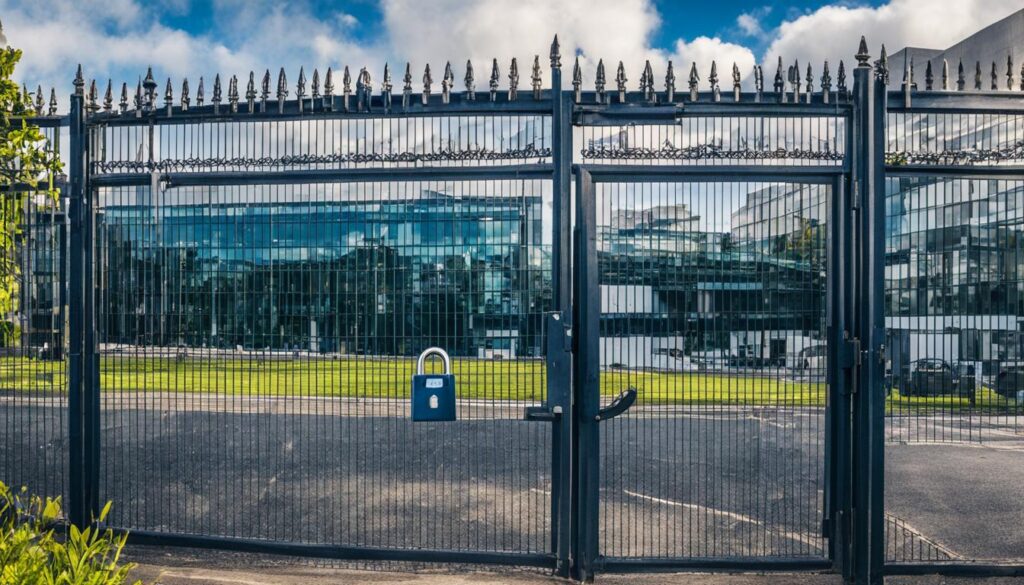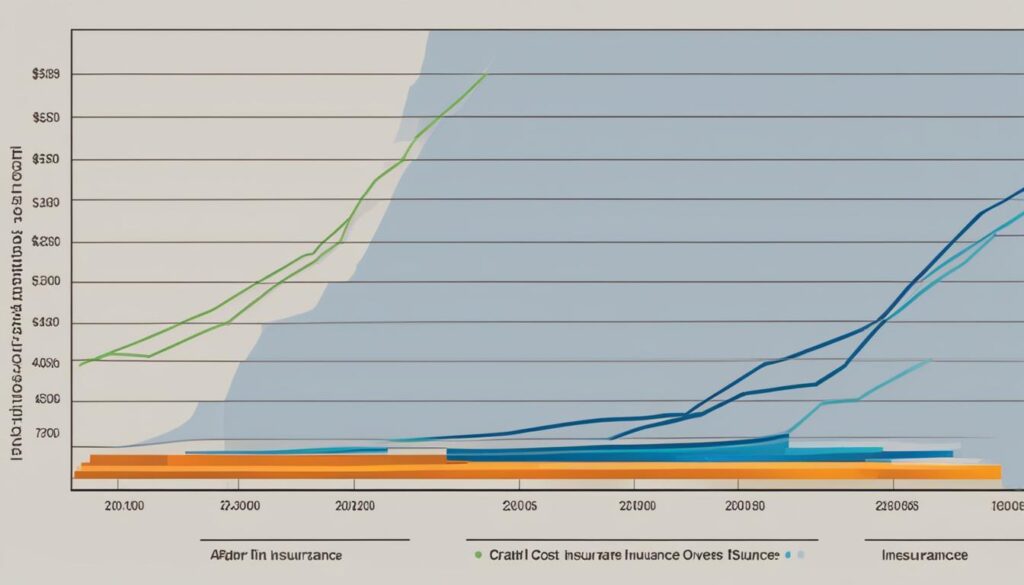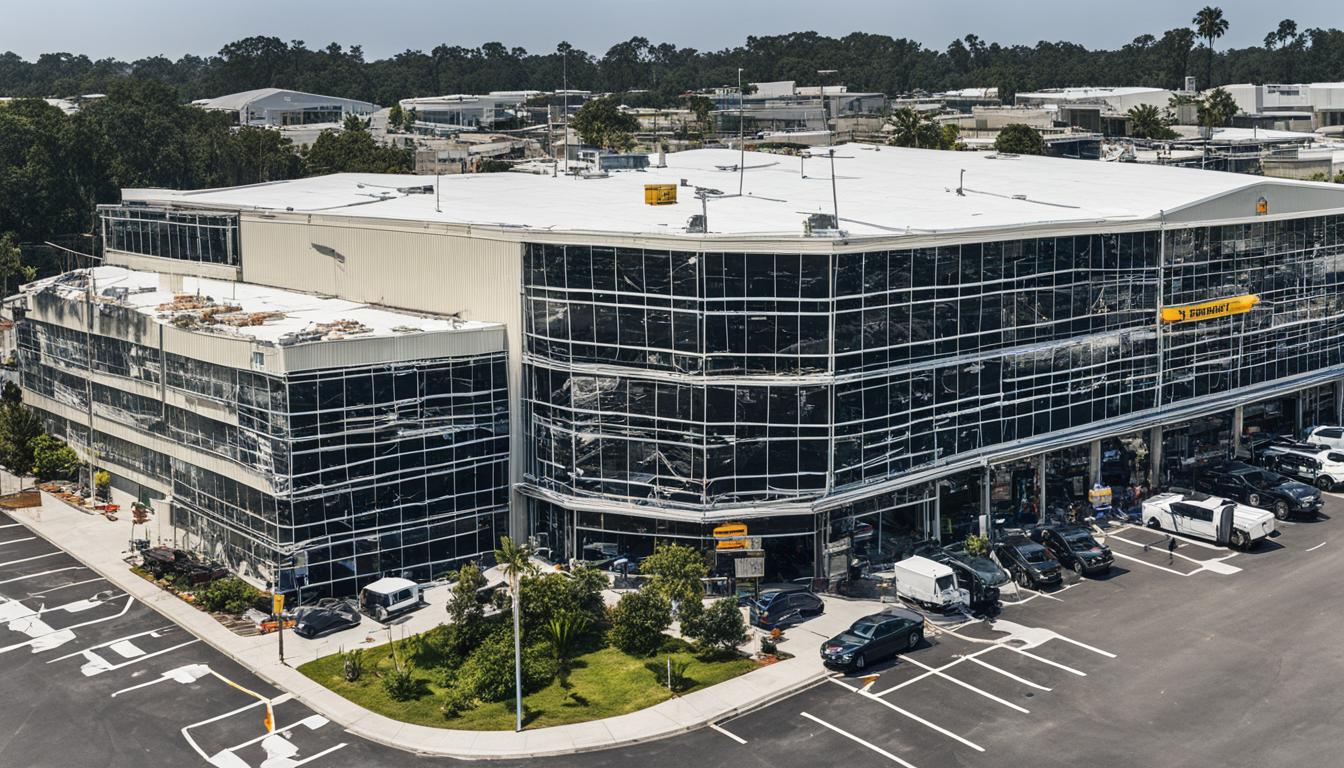Welcome to our comprehensive guide on business property insurance. As a small business owner, it’s crucial to protect your valuable assets from unforeseen events and potential risks. Business property insurance offers the coverage you need to safeguard your property and ensure the smooth running of your operations. In this article, we will explore the different types of coverage, help you assess your specific needs, and provide tips for optimizing your coverage to protect your business.
Key Takeaways:
- Business property insurance provides coverage for your physical assets and protects against unforeseen events.
- Understanding the different types of coverage options is crucial for selecting the right policy for your small business.
- Assessing the value of your property and considering location risks will help you determine the appropriate coverage needed.
- Reviewing your policy annually and implementing loss prevention strategies can help manage insurance costs and minimize risks.
- Partnering with a trusted insurance provider will ensure you have tailored coverage that meets your specific needs.
Understanding Business Property Insurance Essentials
Business property insurance is more than just a contractual agreement; it serves as a vital shield against unforeseen perils. This type of insurance provides essential financial protection for your business and its physical assets, ensuring resilience in the face of unexpected events. By understanding the essentials of business property insurance, you can make informed decisions to secure the right coverage and safeguard your valuable business property.
Business property insurance offers the financial protection you need to mitigate the risks associated with unforeseen events. Whether it’s damage caused by natural disasters, theft, or other unexpected incidents, this type of insurance provides the necessary support to help you recover and rebuild.
Having comprehensive coverage for your business property ensures that you can recover from financial losses resulting from such events. From repairs and replacements to temporary relocation expenses, business property insurance provides the financial resources to ensure business continuity and minimize the impact of unforeseen events on your operations.
When selecting business property insurance, consider factors such as property value, location, and potential risks. Assessing these variables allows you to customize your coverage and ensure that you have the right level of protection for your business property.
“Business property insurance is like a safety net that shields your business from the unpredictable. It offers the financial protection necessary to navigate unforeseen events and maintain the continuity of your operations.”
By understanding the essentials of business property insurance, you can confidently choose coverage that aligns with your business needs. Partnering with an experienced insurance provider further enhances your understanding of the available coverage options and ensures that you make informed decisions.
Take the next step in protecting your business by exploring the different coverage options for business property insurance. With financial protection against unforeseen events, you can safeguard your valuable assets and maintain the stability and continuity of your operations.
Preventing Financial Loss with Business Property Insurance
Business property insurance is designed to provide financial protection against unforeseen events that could lead to significant financial losses. By having the right coverage in place, you can mitigate the risks associated with these events and prevent financial devastation to your small business.
Some of the unforeseen events that business property insurance can protect you from include:
- Natural disasters such as fires, floods, earthquakes, and storms.
- Accidental damage, such as water leaks or electrical faults.
- Theft and vandalism.
- Business interruption due to covered events.
Having business property insurance ensures that you can recover from these events without facing overwhelming financial burdens. It gives you the peace of mind and financial security to focus on rebuilding and getting your business back on track.
Types of Business Property Insurance Coverage
When it comes to protecting your business property, having the right insurance coverage is crucial. There are different types of coverage options available, each tailored to specific needs and risks. One type of coverage that is commonly chosen by businesses is commercial property insurance. Commercial property insurance is designed to safeguard your physical assets and provide financial protection against damages or losses.

With commercial property insurance, you can rest assured knowing that your business property is protected against a range of risks, such as fire, theft, vandalism, and natural disasters. Whether it’s damage caused by a burst pipe or the theft of valuable equipment, this type of insurance can help cover the costs of repairs or replacement.
It’s important to carefully consider the unique characteristics of your business property when selecting the right coverage. Take into account factors such as the property’s location, size, and value, as well as any potential risks it may face. By understanding your specific needs and the potential risks your property may encounter, you can choose the most appropriate type of coverage to protect your business.
Here is a breakdown of some of the key types of business property insurance coverage:
- Building Coverage: Provides protection for the physical structure of your business property, including walls, roof, and foundation.
- Contents Coverage: Covers the contents of your property, such as furniture, equipment, inventory, and supplies.
- Business Interruption Coverage: Offers financial protection in the event that your business operations are interrupted due to a covered loss, providing coverage for lost income and additional expenses.
- Liability Coverage: Protects your business against claims or lawsuits related to property damage or injuries that occur on your premises.
- Additional Coverage Options: Depending on your business’s unique needs, there may be additional coverage options available, such as equipment breakdown coverage, spoilage coverage for perishable goods, or coverage for outdoor signs and landscaping.
By understanding the different types of business property insurance coverage and selecting the appropriate coverage for your specific needs, you can effectively safeguard your assets and protect your business from potential damages or losses.
Assessing Your Coverage Needs
When it comes to business property insurance, assessing your coverage needs is a crucial step in protecting your valuable assets. By evaluating the property value and considering location risks, you can ensure that you select the right coverage for your business property.
Property Value: Start by conducting a thorough appraisal of your business property. This assessment will provide an accurate understanding of its value, enabling you to align your insurance coverage with its actual worth. Knowing the value of your assets ensures that you have adequate protection in place to safeguard your property.
Location Risks: Every location poses unique risks that can impact your business property. Consider factors such as natural disasters, crime rates, and environmental hazards that are specific to your property’s location. Tailoring your coverage to these location risks is essential in mitigating potential damages and ensuring comprehensive protection.
By carefully assessing your coverage needs based on property value and location risks, you can make informed decisions when selecting the right coverage for your business property. This evaluation will provide the foundation for a robust insurance policy that safeguards your assets.
Key Factors for Assessing Coverage Needs
| Factors | Description |
|---|---|
| Property Value | Evaluate the worth of your business property accurately to align coverage. |
| Location Risks | Consider specific hazards associated with your property’s location to tailor coverage. |

In order to protect your valuable business assets, it is essential to assess the value of your property and understand the risks associated with its location. This evaluation will help guide you in selecting the right coverage for your business property, ensuring comprehensive protection against potential damages and losses.
Navigating Policy Details
Understanding the inclusions and exclusions of your business property insurance policy is essential. It enables you to make informed decisions about your property’s financial protection and ensures that you have a clear understanding of what is covered and what is not.
By diving into the intricacies of your policy, you can clarify any doubts and address any coverage gaps. This knowledge empowers you to tailor your insurance coverage based on your specific needs, ensuring comprehensive protection for your valuable business assets.
“Having a deep understanding of your policy’s inclusions and exclusions allows you to navigate potential challenges and avoid unexpected financial burdens. It’s essential to analyze the policy details to ensure it aligns with your risk profile and provides the necessary coverage for your business property.”
Being well-informed about your policy’s inclusions and exclusions also helps you determine which additional coverage options you may need. For example, if your business is located in an area prone to natural disasters, you may want to consider additional coverage for damages caused by such events.
Key Points to Consider:
- Thoroughly review your policy documents to understand the extent of policy inclusions and exclusions.
- Pay attention to any limitations or exceptions that may impact your coverage.
- Consult with your insurance provider or agent to seek clarification on any policy details that are unclear.
- Consider the specific risks associated with your business property and evaluate if the policy adequately addresses those risks.
By taking the time to navigate your business property insurance policy’s details, you can make informed decisions that protect your business assets and provide you with peace of mind.

Implementing Loss Prevention Strategies
Loss prevention strategies are key in mitigating risks and optimizing your coverage options and premiums. By implementing robust security systems and effective hazard mitigation measures, you can significantly reduce the likelihood of property damages and improve your insurance coverage. Taking proactive steps to address potential risks not only protects your valuable assets but also allows you to effectively manage costs.
Security Systems for Comprehensive Protection
Investing in state-of-the-art security systems can act as a strong deterrent to potential threats while enhancing the safety of your business property. Alarm systems, surveillance cameras, access control, and fire detection systems are just a few examples of security measures that can safeguard your premises against theft, vandalism, and other security breaches. These systems not only serve as a protective barrier but also provide valuable evidence should an incident occur.
Hazard Mitigation for Risk Reduction
Identifying and mitigating potential hazards that could lead to property damage is vital in minimizing risks and optimizing your coverage. Conducting thorough risk assessments will help you identify areas of vulnerability and implement appropriate preventive measures. This can include steps such as reinforcing structures, installing fire suppression systems, implementing proper drainage systems, and securing valuable equipment or inventory. By taking proactive hazard mitigation measures, you demonstrate your commitment to safeguarding your business property and reducing the frequency and severity of potential losses.
To further enhance your loss prevention strategies, consider the following:
- Maintain regular maintenance and inspections of your security systems and hazard mitigation measures to ensure optimal functionality.
- Implement training programs and safety protocols for your employees to enhance awareness and preparedness.
- Establish strong relationships with local law enforcement and emergency response agencies for prompt and effective support.
- Stay updated with the latest security and hazard mitigation technologies and industry best practices to continuously improve your loss prevention efforts.
By incorporating comprehensive loss prevention strategies into your business operations, you not only mitigate risks but also enhance your coverage options and minimize insurance premiums. Insurance providers recognize the value of proactive risk management, and by demonstrating your commitment to protecting your assets, you can optimize your coverage and ensure the long-term sustainability of your business.
Continue reading to gain insights into the cost of property insurance and strategies to effectively evaluate and manage insurance costs.
| Benefits of Implementing Loss Prevention Strategies |
|---|
| Reduces the likelihood of property damages |
| Enhances insurance coverage options |
| Minimizes insurance premiums |
| Deters potential threats and intrusions |
| Improves overall business security |

Understanding the Cost of Property Insurance
When it comes to property insurance, understanding the cost factors can help you effectively manage insurance premiums for your business. Several key elements influence the pricing of property insurance, including:
- Property Value: The value of your business property plays a significant role in determining insurance premiums. Higher-valued properties typically entail higher costs to insure.
- Location: The geographic location of your business property can impact insurance costs. Areas prone to natural disasters or high crime rates may lead to higher premiums due to increased risk.
- Type of Coverage: The specific type of coverage you choose for your business property also affects insurance costs. Comprehensive coverage that protects against a wide range of perils generally carries a higher price tag.
It’s important to assess these cost factors and their impact on insurance premiums while considering the coverage needs of your business property.
Cost-Saving Strategies
Fortunately, there are strategies to help optimize insurance costs without compromising coverage. Here are some cost-saving strategies to consider:
- Bundling Policies: Bundling multiple policies, such as property and liability insurance, with the same provider can often result in discounted premiums.
- Implementing Safety Measures: Installing security systems, fire alarm systems, and implementing other safety measures can reduce the risk of property damage, potentially lowering insurance costs.
- Reviewing Coverage Regularly: Conducting an annual review of your insurance coverage allows you to identify any unnecessary or insufficient coverage, ensuring you only pay for what you truly need.
- Seeking Professional Guidance: Consulting an experienced insurance agent or broker can provide valuable insights into cost-saving strategies specific to your industry and property type.
By implementing these strategies and staying proactive in managing your insurance costs, you can protect your business property while optimizing your budget.

| Cost Factors | Impact on Premiums |
|---|---|
| Property Value | Higher property value typically leads to higher premiums. |
| Location | Areas with higher risks may result in higher insurance costs. |
| Type of Coverage | Comprehensive coverage tends to have higher premiums. |
Evaluating Policy Performance
Regularly reviewing your business property insurance policy is essential to ensure it aligns with any changes in property value, upgrades, or renovations. Annual policy reviews provide an opportunity to make necessary adjustments and ensure your coverage meets your current needs.
When conducting a policy review, consider the following:
- Policy Inclusions: Evaluate the coverage provided by your policy and ensure it includes all necessary provisions to protect your business property.
- Policy Exclusions: Familiarize yourself with the situations and circumstances that are not covered by your policy to prevent any surprises during property-related challenges.
- Claims Handling Procedures: Understand the step-by-step process for filing and handling claims. This knowledge will streamline the process and minimize stress in case of property-related challenges.
By reviewing and evaluating your policy, you can make informed decisions about whether adjustments are needed to better protect your business property. Regular policy reviews also provide an opportunity to identify potential coverage gaps and address them accordingly.
Remember, navigating insurance policies can be complex, so it might be helpful to consult with an insurance professional who can provide guidance and property insurance can help property damage business personal property insurance general liability insurance business income insurance
replacement cost coverage can help commercial property insurance policy expertise in evaluating your policy’s performance.
Sample Table: Evaluating Policy Performance
| Aspect | Consideration |
|---|---|
| Policy Inclusions | Review coverage provisions |
| Policy Exclusions | Understand what is not covered |
| Claims Handling Procedures | Know the process for filing and handling claims |
Partnering with an Insurance Provider
When it comes to securing the best coverage for your business property, partnering with a trusted insurance provider is paramount. An experienced insurance provider offers the guidance and expertise necessary to navigate the complexities of insurance effectively.
By working closely with an insurance provider, you will have access to tailored coverage options that cater to your specific needs. They will take the time to understand your business and its assets, ensuring that you have the right level of protection in place.
Also Read:- Is Permanent Life Insurance Bad? Uncover The Truth
Having a dedicated insurance partner means that you can rely on their knowledge and industry insights to make informed decisions about your coverage. Whether you need to expand your policy, modify existing coverage, or address any gaps, an insurance provider will guide you every step of the way.
Understanding the Benefits
- Expert guidance: An insurance provider brings invaluable expertise to the table, helping you navigate the intricacies of insurance and ensuring you are equipped with the knowledge to make informed decisions.
- Tailored coverage: Your insurance provider will work closely with you to understand your unique needs, allowing them to tailor a coverage plan that provides the necessary protection for your business property.
- Efficient claims handling: When the unexpected happens, an insurance provider can streamline the claims process, guiding you through the necessary steps and ensuring a swift resolution.
- Risk mitigation: Insurance providers can provide valuable risk management insights, helping you identify and mitigate potential risks to your business property.
Your insurance provider is more than just a policy issuer; they are a trusted partner who will prioritize your best interests and ensure your business assets are protected.
Take the time to research and select an insurance provider that aligns with your business goals and values. Look for providers with a proven track record, insurance company commercial property coverage positive customer reviews, and a comprehensive range of coverage options.
Remember, partnering with an insurance provider is an investment in the long-term success and resilience of your business. With their guidance and expertise, you can have peace of mind knowing that your business property is safeguarded against unforeseen events.
Conclusion
Business property insurance plays a crucial role in risk management and asset protection for your small business. By understanding the different coverage options available and assessing your specific needs, you can effectively navigate the landscape of business property insurance. It is essential to implement loss prevention strategies and partner with a trusted insurance provider to ensure the right coverage and support for your valuable business assets.
Protecting your business property is vital to safeguarding your investment. With the right insurance coverage, you can mitigate the financial risks associated with potential damages, losses, or unforeseen events. By proactively assessing your coverage needs and implementing security measures, you can minimize risks and optimize your insurance costs.
Partnering with an insurance provider is key to accessing expert guidance and tailored coverage options. Their expertise and support will help you make informed decisions and ensure that your business property is adequately protected. Remember, business property insurance is an essential component of overall risk management and asset protection for your small business.
FAQ
Why is business property insurance important for small businesses?
Business property insurance is important for small businesses because it provides coverage for their physical assets and protects them from unforeseen events and potential risks.
What does business property insurance cover?
Business property insurance covers damages or losses to your business property, including buildings, equipment, inventory, and other assets.
How do I determine the coverage I need for my business property?
To determine the coverage you need, assess the value of your business property and consider the potential risks associated with its location and characteristics.
What are the different types of business property insurance coverage?
There are different types of business property insurance coverage, including commercial property insurance, which provides financial protection against damages or losses to physical assets.
How can loss prevention strategies impact my coverage options?
Implementing loss prevention strategies such as security systems and hazard mitigation measures can reduce the likelihood of property damages, help your business help protect your business
replace property business interruption insurance cost to replace positively affecting your insurance coverage options and premiums.
What factors influence the cost of property insurance?
The cost of property insurance is influenced by factors such as property value, location, and the type of coverage you need for your business property.
How often should I review my business property insurance policy?
It is recommended to review your business property insurance policy annually or whenever there are changes in property value, upgrades, or renovations.
How can partnering with an insurance provider help with business property insurance?
Partnering with an insurance provider can provide expertise and guidance in selecting the right coverage for your business property, ensuring its protection and providing peace of mind.
Who needs commercial property insurance?
ommercial property insurance is essential for a wide range of businesses that own or lease physical spaces for their operations.
How much does Commercial Property insurance cost?
The cost of Commercial Property insurance can vary widely depending on several factors.
Source Links
- https://medium.com/@hafizahsanijaz786/guardians-of-your-assets-navigating-the-landscape-of-property-insurance-for-ultimate-protection-82df5a73a8bb
- https://www.linkedin.com/pulse/protecting-properties-changing-insurance-landscape?trk=public_post_main-feed-card_feed-article-content
- https://www.graystonetx.com/blog/the-importance-of-business-property-insurance




